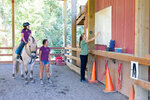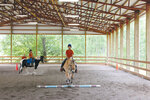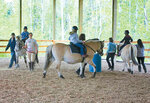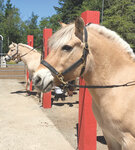



In 1886, the original Horseshoe Cafe opened on Holly Street in downtown Bellingham to serve “ornery folks” like loggers, fishermen, and coal miners who likely made their way there on horseback. Fast-forward 138 years and you’ll still find locals dining at the cafe, even though their mode of transportation has changed from four legs to four wheels.
While it’s still possible to enjoy the abundant green spaces surrounding Bellingham on horseback, what about those who can’t quite so easily saddle up?
Enter the NorthWest Therapeutic Riding Center (NWTRC). Driven by the mission of “giving a leg up to people of all abilities,” it’s certified by the Professional Association of Therapeutic Horsemanship International (PATH Intl.), which accredits riding centers around the world that operate according to a high set of standards that include safety, ethics and effectiveness in equine-assisted services. Instructors must complete workshops and pass exams to become certified to teach equine-assisted services.
Established in 1993 by executive director Julia Bozzo to address the need for recreational activities for people with disabilities in northwest Washington, it started with one therapy horse named Babe and two participants. Today, NWTRC serves close to 100 individuals and has seven therapy horses, two fulltime staff members, and over 100 volunteers. Located in Bellingham, the five-acre facility serves both adults and kids – many of whom go on to later become volunteers.
As we sit inside the “Stable Classroom” (which was built and designed by Bozzo’s husband, who helped found the center), I learn that the structure is heated by horse manure – one innovation of many at the center.
“We serve people with autism, Down Syndrome, muscular control issues, low vision, anxiety, Parkinson’s … basically anyone with physical or behavioral limitations,” explains Bozzo. “Some of our participants could go to another riding program, but they might feel more pressure there; this feels comfortable for them.”
After joining the program, riders learn horsemanship and riding skills as well as about the horses themselves — who also have their own unique personalities.
“The horses we have are the backbone of our program,” adds Hilary Groh, NWTRC’s program director and a PATH Intl. advanced instructor. Bringing with her a degree in therapeutic recreation from Western Washington University, Groh has been riding horses since she was five. “We spend a lot of time with our horses, some of whom have won Horse of the Year; but it’s equally important to make sure the rider is a good fit.”
What Bozzo and Groh are teaching at the center is called “adaptive riding,” which translates to a custom-tailored approach for each participant, about a third of whom are children. The system is taught in sessions, and it deliberately builds upon itself so that both horse and rider became more familiar, and more comfortable, with one another.
“The people who ride with us like consistency, so they’ll use the same horse, with the same group of riders, the same instructor, and at the same time of day,” says Bozzo. “Horses also crave consistency — with their feed, the grooming they receive, when and how they’re worked out; so it’s a good fit.”
All horses at NWTRC are taught how to walk, trot, and canter when given clues by the rider, and the instruction provided is dressage (English-style riding), which can include jumping, if the rider is suited for it. The goal for each participant is riding-skills based, but the therapeutic benefits can include improved balance and coordination, increased physical strength, self-confidence and self-control, peer interaction, and social skills.
The oldest horse on the property is Kleng, a 32-year-old Norwegian Fjord gelding who’s been in the program for 29 years. These days, he’s enjoying his retirement while he watches the reins being handed off to younger horses, including one that just joined the facility this year.
Like the flowers that bloom in springtime, the activities at NWTRC are beginning again. Soon there’ll be riders inside the covered, outdoor arena working on their horsemanship skills, learning how to care for the animals, and perhaps interacting with their peers. But regardless of the season one thing remains constant – despite some limitations, you can still ride off into the sunset at a special place in Bellingham. X
If you happen to own your own horse, or know someone who does, the Whatcom County Parks & Recreation Department offers horse trails at the following locations: Chuckanut Mountain Park, the Interurban Trail, Lily Point Marine Park, Silver Lake Park, Squires Lake Park, and Sunset Farms Park. In the case of the latter (a 70-acre equestrian facility), the non-profit Friends of Sunset Park works to maintain the trails, fencing, and fields.
For riders interested in learning more advanced skills, contact Burkwood Farms – a USHJA recognized riding academy that specializes in hunter-jumper programs.
Whatcom County doesn’t have any day- or trail-ride facilities. The closest one is Lang’s Pony Farm in Mount Vernon which offers trail rides, birthday parties, a horse camp, and riding lessons.
Instructors must complete workshops and pass both written and practical exams to become certified to teach equine-assisted services.